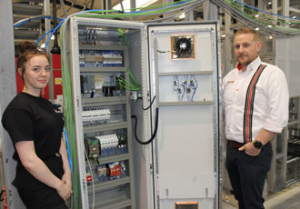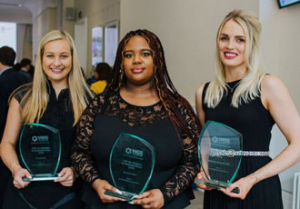Are women in tech doomed from the very beginning?

There are several reasons why there are not enough women in tech as we touched on in last month’s last column, however, when does that discouragement process start? My instinctive answer to this question suggests that it begins in school and at a young age. Is there enough encouragement in STEM subjects for young girls, and if so where does it go wrong? Is it that we have created a society with so many stereotypes that young girls are put off without even realising it?
Although statistics show that the number of women graduating in STEM subjects has increased from 22,020 in 2015/16 up to 22,340 in 2016/17, the number of males graduating in STEM has increased at such a rapid rate that the overall percentage of female graduates has dropped from 25% to 24%.
It was interesting to hear at a recent talk that a lot of young girls perceive STEM subjects to be ‘boys subjects’. Surely we are in an age now where there is no such thing?
In order to encourage more girls into STEM subjects at school and university, as a nation we need to tackle these stereotypes that they are faced with from such a young age, as it is this stage that is the most important in a child’s development.
WHERE?
If we get to the root of the problem, surely it will be easier to fix? So, where do these stereotypes come from? The answer is from many different sources. As children, even at a young age, we can be influenced and absorb gender stereotypes. In a recent study by The Guardian it found that five year old girls are likely to say that they are just as smart as the boys, however when they reach six years of age the study revealed children think that boys are more likely to be smarter than the girls.
The study also found that from this young age girls were more attracted to a game if it was for ‘hard working’ children rather than ‘really smart’ children, which suggests girls believe they have to work harder. However, despite this fact, figures show that girls on average are outperforming boys at school in STEM subjects.
HOW?
In order to attract more girls into STEM subjects we need to tackle the stereotypes exposed to them and we need to do this early on. But how? One key way would be to have more role models for them to look up to - young children are very impressionable and so to have empowering females going into schools and inspiring young girls will be something that could easily stay with them throughout their school journey and inspire them into the industry. Boys have several role-models to aspire to within science and engineering (Guy Martin, Tim Peake, Brian Cox et al) but young girls need females they can relate to as well (and they are not so prevalent), so as much as male role models can help, quite often females would be far more effective.
It is quite frustrating for women in the industry to hear that we need to do this or do that to get girls interested in STEM’, when a lot of girls are already interested. So one of the additional challenges is making it easier for girls to STAY interested in studying STEM subjects. For a lot of young women, when they do show an interest, they have traditionally been faced with teachers and a society as a whole, with a narrow vision of what a STEM-based career can offer young women.
Maybe the first challenge is educating everyone (not just women), about STEM and then getting STEM subjects interested in them.
WHY?
It is important to ensure girls from a young age are getting a fair chance to start with, otherwise we could just end up with an even bigger gender pay gap further down the line?
The gender pay gap coming to light last year has to be one of the best things for encouraging young women into STEM subjects, and has featured a lot within the news. It has also provoked a number of charities and organisations to come together to help women into the industry.
In fact a number of local community groups and charities with a specific focus on inspiring young women into STEM are being given opportunities to apply for up to £20,000 from the People’s Postcode Trust, a grant-giving charity funded entirely by players of the People’s Postcode Lottery.
The trust is particularly interested in receiving applications from projects aiming to support women with employability skills for STEM industries. A project that has previously received funding was a series of creative digital and coding skills workshops for girls aged 11-18. This is a fantastic opportunity for organisations and projects with a similar focus to benefit from a funding boost.
WHO?
This is a worldwide issue not just a UK issue, and the NEA International Mentoring Workshop in Science and Engineering returned to Japan in 2018 to motivate more young females in Asia to consider science and engineering careers and to help them overcome any barriers they may face along the way, following such a huge success in 2017.
In the UK we do have the WISE organisation (Women in STEM) which aims to enable and energise people in business, industry and education to increase the participation, contribution and success of women in science, technology, engineering and mathematics (STEM). The UK also has WES (Women’s Engineering Society) which again is an organisation that inspires young women to achieve the potential they have as engineers, scientists, but most importantly leaders, assisting educators, managers and employers in making this happen for young females.
WISE actually tracks and monitors progress of a critical mass of women working in the UK STEM workforce through a Labour Force Survey which breaks down the different occupations of females, and currently the figures show women make up 14.4% of all UK STEM workers. In the past year the UK has seen 104,000 more women working in STEM.
WHEN?
We need to act now and we need to act fast to address the burgeoning skills gap. With a number of events happening all the time, this is the first step in the movement towards encouraging more young women into studying STEM subjects, but we need to make people more aware and these events more well-known.
In December the IET (Institution of Engineering and Technology) is hosting the IET’s Young Woman Engineer of the Year Awards, where lives and perceptions are changed. This looks out for the best young women engineers in the UK and celebrates the women in the industry.
This article isn’t meant to make STEM subjects, and the lack of females studying them, a story that is all doom and gloom. The truth is that we are moving in the right direction, maybe just not at a pace a lot of women would like. With a lot of different approaches to trying to fix the problem, we need to address all the challenges and see which solutions are working and if not, take a step back and see what is going wrong. Over the next few years if the numbers of girls in STEM subjects doesn’t increase, then the Government may need to take a look at restructuring its education system to make it work better for girls.
Going back to one of my first comments, we should live in a society where there is no such thing as girls’ subjects and boys’ subjects, and that doesn’t just mean STEM for girls, that means childcare, arts and beauty for boys too – nobody’s learning path should be restricted due to their gender.
To read a similar article click here.
For further reading on this topic visit this article.
If you enjoyed this article you can click here for more.
Similar articles
More from Electronic Specifier
- Building the case for construction offices in 2021 20th May 2021
- UK construction: is the industry finally on the up? 26th August 2020
- Speaking to a younger generation of women in tech 11th August 2020
- Engineering firms encouraged to get ‘2020’ vision 6th January 2020












Write a comment
No comments